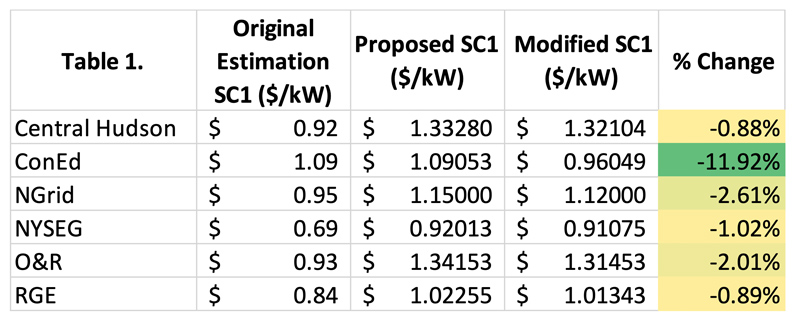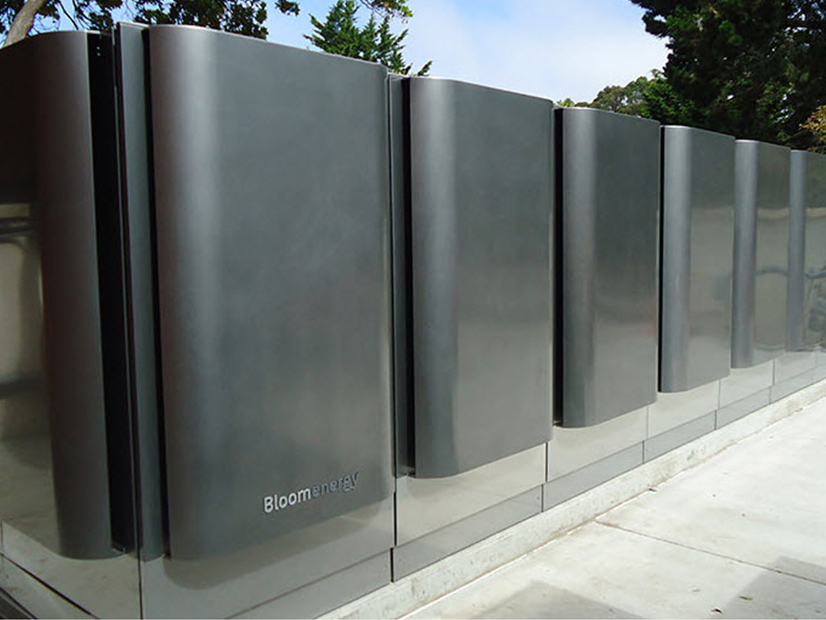Clean energy advocates, environmentalists, and fuel cell and solar developers this week urged New York regulators to reject utilities’ proposals to incorporate new net energy metering (NEM) customer benefit contribution (CBC) charges in their tariffs (Case No. 15-E-0751).
The state’s Public Service Commission issued a successor NEM order last July and set a June 14 deadline for comments on the CBC issue. At a technical conference in March, the state’s investor-owned utilities presented proposed tariff changes to extend Phase 1 NEM through Jan. 1, 2022 and to assess CBC monthly based on the nameplate rating in kW (DC) of qualifying generating equipment, with final tariff filings due July 1.
Fuel cell developer Bloom Energy said the utilities “apparently ignored” the PSC’s directive to further evaluate utility filings in the Value of Distributed Energy Resources (VDER) Rate Design Working Group and fully analyze the appropriate CBC to apply to customers that pay demand charges. The company said the utilities “proposed the imposition of CBC charges at the same rate for demand metered customers as for non-demand metered customers.”
The filed draft tariffs “are therefore wholly unjustified as applied to demand metered customers,” meaning any aspects of the filings that apply CBC charges to those customers should be rejected, Bloom Energy said.
The CBC charge is meant to reflect the charges a utility would have collected from a customer for certain public benefit programs had the customer not relied on its DER to displace a portion, or all, of their volumetric billings. Solar developers objected that the utilities had based their CBC calculations on a paid solar installation rather than on the financed purchase prevalent in the market.
Sun Source Technologies said the calculated CBC charges would dramatically reduce Year 1 customer savings, which is the crucial determining metric in the marketing and sales of financed solar PV systems because “the overwhelming majority (over 60%) of our residential customers finance the purchase of a solar system via loan products … [and] the initial cash outlay associated with a financed system is minimal compared to a cash-purchased system.”
ETM Solar Works said the proposed CBC charge for New York State Electric and Gas “would drive a decline from $92 to $1, or 98% in Year 1 savings, which would dramatically reduce the value proposition for going solar and customer adoption rates.”
Solar developers in May urged the commission to help sustain PV growth by making simple adjustments to the VDER tariff based on environmental value rather than create complicated new processes. (See NY Officials Told to Stay the Course on CDG Solar.)
Exclude DLM, Help the Poor
The Clean Energy Parties asked the commission to exclude the dynamic load management (DLM) program from the CBC calculations “because it was not specified in the language of the order, has a meaningful impact on the size of the CBC, and will hurt customer solar adoption.” The group includes the Alliance for Clean Energy New York, Coalition for Community Solar Access, Natural Resources Defense Council, New York Solar Energy Industries Association, Solar Energy Industries Association and Vote Solar
The parties also asked the commission to require the utilities to rerun the calculations in the compliance filings to base the CBC only on the contributions from non-NEM customers, and for the commission to clarify that the CBC should not be applied to non-residential and demand metered customers.

New York City said the commission should reject the utilities’ proposals to allocate 100% of the CBC charge to specified customer classes taking value stack compensation and include DLM program costs in the CBC calculation.
For many of Con Edison’s large commercial rate classes, the draft tariffs apply 100% of the CBC charge for Phase One NEM customers to value stack customers of the same rate class, the city said; “To illustrate, the CBC charge for Con Edison SC 5 Rate II is the same for both Phase One NEM and value stack customers ($0.66).”
The city emphasized that CBC charges must be balanced against the city’s and state’s equitable decarbonization objectives, and it urged the PSC to exempt low-income customers and affordable housing projects from the charges.
“Access is a fundamental principle of rate design, and the low and moderate income (LMI) and nonprofit affordable housing customer segments, which already have lower DER adoption rates, should not face additional barriers to participating in and sharing in the benefits of greater solar deployment,” the city said. “Such disparities between solar business models serve to exacerbate inequality and jeopardize energy affordability objectives. Accordingly, the city recommends that LMI customers and affordable housing projects be exempted from the CBC charges.”
The city requested “that the CBC be a long-term solution, if not the successor tariff itself,” and said it supports the annual recalculation of the CBC charges based on changes to public benefit program costs. It also supports the adoption of a reasonable cap (such as 5% annually) on how much the CBC could increase in any given interval.
Absent additional evidence that there is an undue impact on non-participating customers, there is no reason to apply the CBC charge to demand-metered customers, the city said.
In addition, in order to eliminate any ambiguity around the applicability of the CBC charge to energy storage, the city requested that “in the case of distributed energy generation paired with energy storage, the resulting tariffs specify that the CBC charge applies to the capacity rating of the energy generation resource and not the capacity rating of any paired or standalone energy storage.”



